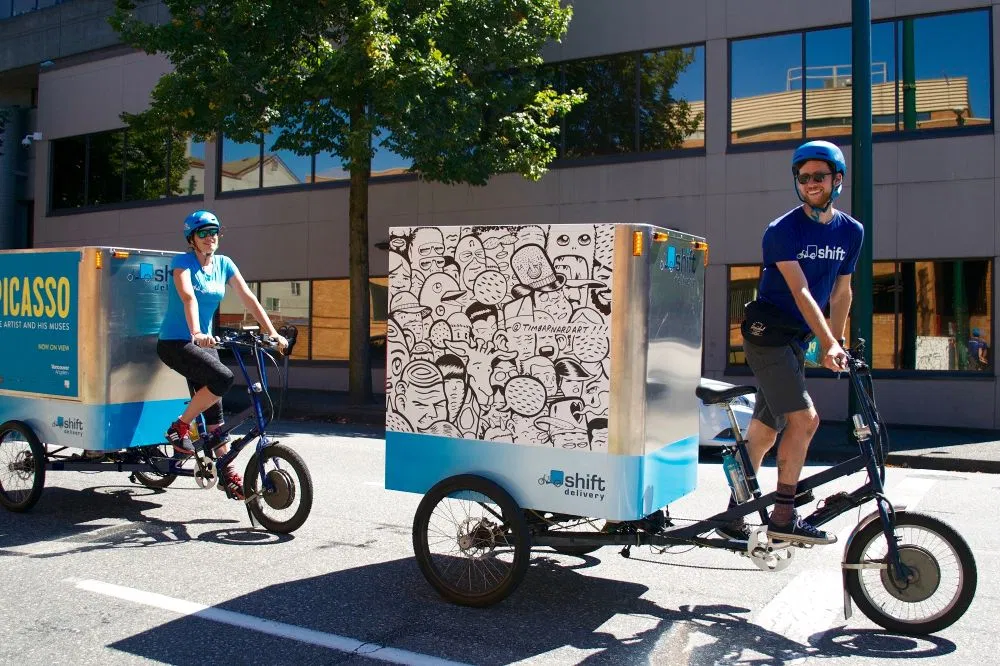Editor's note: This article originally appeared on Urban Mobility Daily and is republished here with permission.
As traffic volumes increase in our city centers, partly fueled by deliveries from a COVID boosted e-commerce sector, organizations are looking for a silver bullet for urban logistics. But has it been sitting right here under our noses all this time?
We think it has. Back on 31st December 2019, Jos Sluijsmans, Founder-Director of the International Cargo Bike Festival, and I declared the 2020s the Decade of the Cargo Bike. Right now, the cargo bike is making a break for the mainstream. And not just in traditional northern European cargo bike heartlands such as the Netherlands and Denmark, but also in places like Germany, France, the UK, and Canada. Sales are booming, with manufacturers reporting increases of over 50% year-on-year despite COVID. However, in spite of their enormous potential, cargo bikes are still thought of by many as an oddity; a niche item.
Real-life case studies show that there is a clear business case for cycle logistics. In recent years the likes of Fedex, DHL, UPS, Amazon, DB Schenker, DPD, GLS and Hermes have all added cargo bikes to their fleets, and across the world cargo bikes are used by organizations of all shapes and sizes. Let’s rewind and explore some of the reasons why.
They’re quicker
Time and time again it has been shown that cargo bikes can get the job done quicker in cities. Data from a cycle logistics hub set up in car-addicted Sydney in 2016 showed that cargo bikes travelled a third few kilometers than vans, taking less than half the time to complete their rounds in the CBD. But how?

Bikes are nimbler, can use cycle lanes, take shortcuts and park with ease. Meanwhile, vans spent three times as long parked up compared to bikes. And whilst bike couriers hardly needed to walk at all – having parked just outside the door — van drivers walked approximately a third of their total distance. In Sydney it’s evidently easier to just park and walk than to constantly drive around looking for parking spaces.
They’re energy-efficient
A study by Velove and the Swedish Energy Agency showed that e-cargo bikes consume 94 percent less energy than traditional e-van for the same deliveries. Yes, you read that right: 94 percent less. Weight is the obvious factor here; the e-van the researchers tested, a Nissan e-NV200, weighed approximately 17 times as much as the e-cargo bike. And like in Sydney, routing is also key, with cargo bikes able to take much shorter routes than e-vans.

Their footprint is small
Many readers will be no strangers to the environmental benefits of ultra-low-emission forms of mobility such as the cargo bike. But what wasn't mentioned in the Swedish study were embodied emissions from manufacture — which are far lower for e-cargo bikes than for e-vans due to the amount of materials consumed.
As well-documented as the health benefits of reduced air pollution are for public health are, it is also becoming clearer that the vehicle tailpipe is not the only part of a car that harms our cities. Fine particulate matter (PM) emissions from tyre and brake wear can have a detrimental effect on urban air quality and have also been shown to cause microplastic marine pollution. Simply swapping ICE vehicles for electric does not appear to mitigate this.

In both cases, cargo bikes do have an environmental impact. However, the lower weights and speeds involved mean that their footprint is orders of magnitude slimmer.
It’s the decade of the cargo bike
In terms of both costs and environmental impact, the cargo bike has a distinct edge – but that’s not all. Depending on where you’re based, cargo bike sales are now often supported by subsidies from local, regional or national government. Cities worldwide are realizing that alongside cycling for personal mobility, cycle logistics is intensely compatible with their efforts to foster livable urban environments. If you close your city centre to internal combustion engine vehicles, the cargo bike is an important ally to keep urban logistics flows going.

The cargo bike’s star is rising, but the benefits don’t come without costs. Organizations must be flexible and adapt to deploy cargo bikes in ways that meet their goals. Smaller city-center first/last mile hubs, when combined with cargo bikes, provide the makings of an agile business model suited to the city of both today and tomorrow.
As we evolve to position ourselves in the new normal, many are on the hunt for that urban logistics silver bullet. Cargo bikes are a solid, proven technology which exists in the here and now. If you proactively invest in the cargo bike, the cargo bike will pay you back. If you’re looking for a mobility solution, consider pedal power – because the humble cargo bike is far more powerful than it looks.
Tom Parr is the co-organizer of the International Cargo Bike Festival. Follow him on Twitter @PomTarr.







